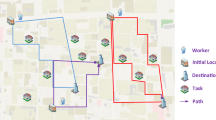Abstract
Mobile crowdsensing has emerged as a new sensing paradigm which has many advantages over traditional sensing paradigms. In this paper, we focus on the task allocation problem for eco-friendly mobile crowdsensing which aims to minimize carbon emissions under various constraints such as task deadline and road traffic constraints. We first describe the system model of eco-friendly mobile crowdsensing and formulate the task allocation problem in offline scenario and online scenario, respectively. Then we propose Eco-Friendly Task Allocation algorithm (EFTA) to address the allocation problem in offline scenario. This algorithm consists of two processes including transportation selection and worker-task matching. After this, we propose Online Eco-Friendly Task Allocation algorithm (OEFTA) to tackle the allocation problem in online scenario. The algorithm adopts greedy online task assignment/reassignment upon arrival of a new task or a new worker. Extensive simulation results show our proposed algorithms have much better performance than baseline algorithms.










Similar content being viewed by others
References
Free speed survey 2011 (urban and rural). http://www.rsa.ie/Documents/Road%20Safety/Speed/Speed_survey_2011.pdf (2018)
OpenStreetMap - free wiki world map. https://www.openstreetmap.org (2018)
SUMO - Simulation of Urban Mobility. https://www.dir.de/ts/sumo (2018)
Cheung MH, Hou F, Huang J (2018) Delay-sensitive mobile crowdsensing: Algorithm design and economics. IEEE Trans Mob Comput 17(12):2761–2774
Choppin S (2009) Emissions by transport type. https://www.theguardian.com/environment/datablog/2009/sep/02/carbon-emissions-per-transport-type
Ganti RK, Ye F, Lei H (2011) Mobile crowdsensing: current state and future challenges. IEEE Commun Mag 49(11):32–39
Gao G, Xiao M, Wu J, Huang L, Hu C (2018) Truthful incentive mechanism for nondeterministic crowdsensing with vehicles. IEEE Trans Mob Comput 17(12):2982–2997
Gong W, Zhang B, Li C (2017) Location-based online task scheduling in mobile crowdsensing. In: Proceedings of IEEE GLOBECOM’17, Singapore, pp 1–6
Gong W, Huang X, Zhang B (2018a) Task assignment for eco-friendly mobile crowdsensing. In: The 15th EAI International Conference on Mobile and Ubiquitous Systems: Computing, Networking and Services (MobiQuitous’18), pp 127–134
Gong W, Zhang B, Li C (2018b) Task assignment in mobile crowdsensing: Present and future directions. IEEE Netw 32(4):100–107
Gong W, Zhang B, Li C (2019) Location-based online task assignment and path planning for mobile crowdsensing. IEEE Trans Veh Technol 68(2):1772–1783
He S, Shin DH, Zhang J, Chen J (2014) Toward optimal allocation of location dependent tasks in crowdsensing. In: Proceedings of Infocom’14, pp 745–753
Liu Y, Guo B, Wang Y, Wu W, Yu Z, Zhang D (2016) Taskme: Multi-task Allocation in mobile crowd sensing. In: Proceedings of the 2016 ACM International Joint Conference on Pervasive and Ubiquitous Computing (UbiComp’16), Heidelberg, Germany, pp 403–414
LWeber C, ScottMatthews H (2008) Quantifying the global and distributional aspects of american household carbon footprint. Ecol Econ 66(2-3):379–391
Munkres J (1957) Algorithms for the assignment and transportation problems. J Soc Ind Appl Math 5(1):32–38
Ramshaw L, Tarjan RE (2012) On minimum-cost assignments in unbalanced bipartite graphs. Technical report, HP Laboratories
Sun F, Wang Z, Wang J (2003) Statistical analysis on the average speed of public buses in beijing. Automot Eng 25(3):219– 222
Tang Z, Guo S, Li P, Miyazaki T, Jin H, Liao X (2015) Energy-efficient transmission scheduling in mobile phones using machine learning and participatory sensing. IEEE Trans Veh Technol 64(7):3167–3176
Wang J, Wang Y, Zhang D, Wang F, Xiong H, Chen C, Lv Q, Qiu Z (2018a) Multi-task allocation in mobile crowd sensing with individual task quality assurance. IEEE Trans Mob Comput 17(9):2101–2113
Wang L, Yu Z, Han Q, Guo B, Xiong H (2018b) Multi-objective optimization based allocation of heterogeneous spatial crowdsourcing tasks. IEEE Trans Mob Comput 17(7):1637–1650
Wang L, Yu Z, Zhang D, Guo B, Liu CH (2019) Heterogeneous multi-task assignment in mobile crowdsensing using spatiotemporal correlation. IEEE Trans Mob Comput 18(1):84–97
Xiong H, Zhang D, Chen G, Wang L, Gauthier V, Barnes L (2016) iCrowd: Near-optimal task allocation for piggyback crowdsensing. IEEE Trans Mob Comput 15(8):2010–2022
Zhang B, Song Z, Liu CH, Ma J, Wang W (2015) An event-driven qoi-aware participatory sensing framework with energy and budget constraints. ACM Trans Intell Syst Technol 6(3):1–19
Acknowledgements
This work was supported in part by the NSF of China under Grant Nos. 61872331, 61531006, 61471339.
Author information
Authors and Affiliations
Corresponding author
Additional information
Publisher’s Note
Springer Nature remains neutral with regard to jurisdictional claims in published maps and institutional affiliations.
Rights and permissions
About this article
Cite this article
Gong, W., Huang, X., Zhang, B. et al. Task Allocation in Eco-friendly Mobile Crowdsensing: Problems and Algorithms. Mobile Netw Appl 25, 491–504 (2020). https://doi.org/10.1007/s11036-019-01312-9
Published:
Issue Date:
DOI: https://doi.org/10.1007/s11036-019-01312-9




